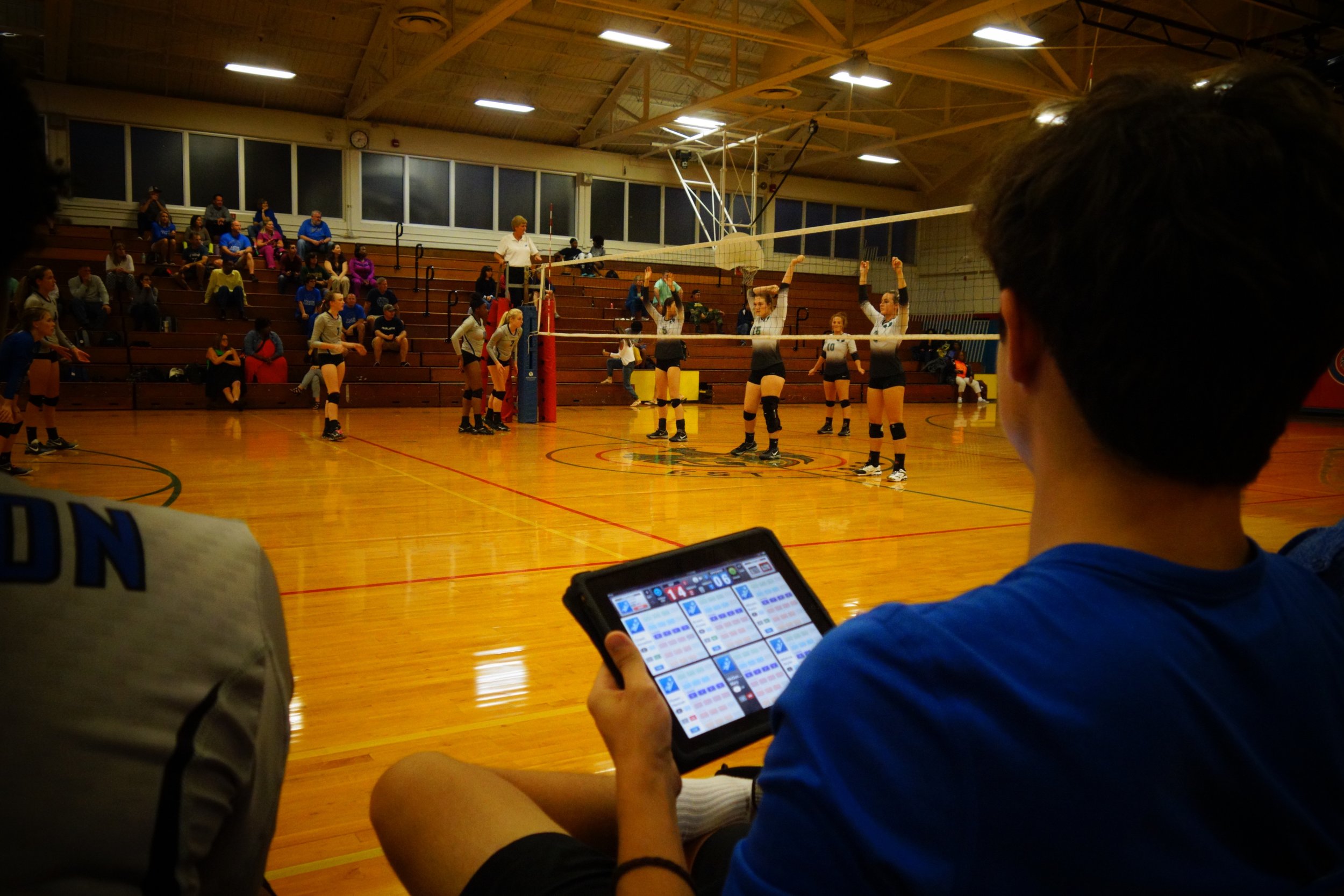Gender and Sports
By jake nachman
photo by Katie Stevens
JACKSONVILLE, Fla. (SCPDA) — The score was 14-14 and tensions were high as Stanton College Preparatory School’s girls’ varsity volleyball team competed against Bishop Kenny High School at the District State Championship in October. Among the crowd was sophomore Sameh Arsalla, who sat on the sidelines, awaiting the next play. He wanted to get on the court and help his team, but one thing confined him to the bench: his gender.
Arsalla served as the manager of the girls’ volleyball team during the 2017–2018 season and recorded player statistics during games, took part in practices and advised members of the team on their technique. Outside of school, Arsalla has played club volleyball for three years with the Jacksonville Juniors Volleyball Association (JJVA) and is currently a member of the 16U boys’ team. He also participates in beach volleyball tournaments around the state. Despite his extracurricular involvement in the sport, he still wishes to compete for a school team.
“I just want to represent my school,” said Arsalla. “I love playing volleyball so I’ll play wherever and whenever.”
However, due to Florida High School Athletic Association (FHSAA) rules regarding gender participation in high school sports, Arsalla is not allowed to join the Stanton volleyball team as an active player. This is a matter of contention for both Arsalla and the girls who view him as just as much of a teammate as anyone else.
“Every guy would want to join the volleyball team and that would be unfair to the girls who try out and the other teams that we would play,” said senior Kayla Witucki, captain of the girls’ varsity volleyball team. “I think a better alternative would be putting the effort to make a boys’ team.”
Section 8.6.2 of the FHSAA bylaws states “boys may not participate on a girls’ team in any sport if the school’s overall boys’ athletic program equals or exceeds the girls’ overall athletic program.” The rule, which is designed to maintain the fairness within and between female athletic teams, prohibits Arsalla from joining the team.
“It’s disappointing because I feel like every other sport is represented at Stanton. All of my friends get to play their main sport of choice and mine just isn’t offered,” said Arsalla. “There is nothing I can do about it so being the manager is the closest I’ll get to playing.”
While a plausible solution to Arsalla’s problem seems to be the creation of a boys’ volleyball team, Stanton’s unique gender demographics make things more complicated. According to Coach Chris Crider, Stanton’s Athletic Director, the proportion of female students at a school must be the same as the proportion of female athletes at a school to be in accordance with Title IX. The average Florida high school is 49 percent female whereas Stanton is 53 percent female, meaning 53 percent of student athletes must also be female. The addition of a new male sport would disrupt this balance.
“Let's say we were to add boys’ volleyball. Now that ratio has changed because there are more boys participating,” said Coach Crider. “Then we would have to figure out another sport that we can allow girls to participate in or it would just totally mess up our numbers.”
In addition to these statistical issues, the lack of competition is also a problem. According to the 2017–2018 FHSAA boys’ volleyball state series assignments, there are currently no high schools in Jacksonville with a boys’ volleyball team. Even if Stanton did create a team, there would not be another team nearby for them to play against.
“For there to be a competitive boys’ team in the FHSAA, there would have to be a lot of other competitive teams in the area,” said Ms. Tangela Ennis, the varsity girls’ volleyball coach. “Right now it’s just a matter of raising awareness to the game and growing the popularity of the game here in Jacksonville so that we can get more boys interested.”
Although the volleyball team can sympathize with their manager’s frustration, they also understand the implications of Arsalla being able to join the team. The formation of a coed division of volleyball would not only create these problems for Stanton’s team, but require a set of rules and restrictions for all teams to ensure the fairness of the sport.
“For there to be a competitive boys’ team in the FHSAA, there would have to be a lot of other competitive teams in the area. Right now it’s just a matter of raising awareness to the game and growing the popularity of the game here in Jacksonville so that we can get more boys interested.”
“If they were to form a coed situation, I think there would have to be a lot of thought that goes into the restrictions to make sure that it is competitive,” said Ms. Ennis. “You don’t want to have a girls’ team that has four or five guys on it playing against a girls’ team that has no guys on it.”
photo by Katie Stevens
There are multiple ways Arsalla can attempt to pursue volleyball at Stanton, but each method has its own flaws and drawbacks. Currently, it seems that Arsallah will have to remain a manager on the girls’ varsity volleyball team. However, with enough support, effort and time, there is a possibility that Arsallah could be playing volleyball at Stanton in the future.
“Hopefully next year I can start a club that would be open to anybody,” said Arsalla. “I’ll talk to some people, hopefully get some sponsors, get approval and we’ll see if I can make it happen for next year.”


